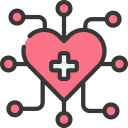Predictive Analytics and AI in Healthcare Management
Predictive analytics and artificial intelligence (AI) are transforming the landscape of healthcare management by enabling providers and administrators to anticipate challenges, enhance patient outcomes, and optimize operational efficiency. With the integration of these cutting-edge technologies, healthcare systems are moving from reactive to proactive models of care. This improvement is impacting everything from early disease detection to resource allocation, ensuring a more effective and personalized approach to healthcare delivery. By leveraging vast datasets and sophisticated algorithms, predictive analytics and AI empower medical professionals to make data-driven decisions that benefit both patients and organizations.

Revolutionizing Patient Care with Predictive Analytics
Early Disease Detection and Prevention
Predictive modeling allows clinicians to identify patterns and risk factors long before symptoms surface. By analyzing a patient’s medical history, genomics, and lifestyle data, AI algorithms can predict an individual’s likelihood of developing chronic illnesses such as diabetes or heart disease. This knowledge empowers healthcare teams to develop personalized prevention plans, initiate early interventions, and monitor progress more effectively. Ultimately, early detection leads to better disease management and improved patient quality of life, while also reducing the burden on healthcare systems.


Personalized Treatment Planning
With the help of predictive analytics and AI, treatments can be precisely tailored to meet each patient’s unique needs. Algorithms sift through complex datasets to suggest the most effective therapeutic approaches based on genetics, comorbidities, and response to previous treatments. This results in higher treatment efficacy and reduced adverse reactions. Physicians can now make more informed decisions, ensuring that patients receive therapies with the highest likelihood of success, minimizing trial-and-error approaches and improving overall satisfaction with care.
Enhancing Operational Efficiency in Healthcare Organizations
Healthcare institutions often struggle to allocate critical resources such as ICU beds, medical equipment, and staffing efficiently. Predictive analytics models can forecast demand for these resources based on historical admissions, seasonal trends, and population health data. These insights enable administrators to make proactive decisions regarding inventory management and capacity planning. Consequently, this reduces bottlenecks, ensures optimal use of resources, and improves patient access to essential services, even during surges or emergencies.

Improving Population Health and Preventive Strategies
Using de-identified aggregated data from various sources, predictive analytics can pinpoint populations with elevated risk profiles for specific conditions. These insights allow public health teams to prioritize outreach, screening, and education initiatives in communities where they are needed most. By targeting high-risk groups efficiently, resources are utilized more effectively, leading to better overall health outcomes and reducing disparities in care delivery.

Join our mailing list
